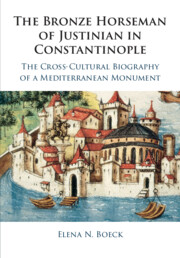 The Bronze Horseman of Justinian in Constantinople
The Bronze Horseman of Justinian in Constantinople Book contents
- The Bronze Horseman of Justinian in Constantinople
- The Bronze Horseman of Justinian in Constantinople
- Copyright page
- Contents
- Figures and Maps
- Tables
- Acknowledgements
- Abbreviations
- Note on Transliteration and Naming Conventions
- Selected Timeline of the Triumphal Column of Justinian and Its International Reverberations
- Map of Constantinople
- Introduction
- 1 Justinian’s Entry into Constantinople: He Came, He Saw, He Conquered
- 2 The Making of Justinian’s Forum
- 3 Defying a Defining Witness: the Bronze Horseman and the Buildings (De Aedificiis) of Prokopios
- 4 The Horseman of Baghdad Responds to the Horseman of Constantinople
- 5 Soothing Imperial Anxieties: Theophilos and the Restoration of Justinian’s Crown
- 6 Debating Justinian’s Merits in the Tenth Century
- 7 The Bronze Horseman and a Dark Hour for Humanity
- 8 The Horseman Becomes Heraclius: crusading Narratives of the Eleventh and Twelfth Centuries
- 9 From Exile in Nicaea to Restoration of Constantinople
- 10 A Learned Dialogue across the Ages: Pachymeres Confronts Prokopios
- 11 Orb-Session: Constantinople’s Future in the Bronze Horseman’s Hand
- 12 Justinian’s Column and the Antiquarian Gaze: a Centuries-Old “Secret” Exposed
- 13 A Timeless Ideal: Constantinople in Slavonic Imagination of the Fourteenth–Fifteenth Centuries
- 14 The Horseman Meets Its End
- 15 Horse as Historia, Byzantium as Allegory
- 16 Shadowy Past and Menacing Future
- 17 After the Fall: the Bronze Horseman and the Eternal Tsar’grad
- Postscript: the Horseman’s Debut in Print
- Select Bibliography
- Index
11 - Orb-Session: Constantinople’s Future in the Bronze Horseman’s Hand
Published online by Cambridge University Press: 08 April 2021
- The Bronze Horseman of Justinian in Constantinople
- The Bronze Horseman of Justinian in Constantinople
- Copyright page
- Contents
- Figures and Maps
- Tables
- Acknowledgements
- Abbreviations
- Note on Transliteration and Naming Conventions
- Selected Timeline of the Triumphal Column of Justinian and Its International Reverberations
- Map of Constantinople
- Introduction
- 1 Justinian’s Entry into Constantinople: He Came, He Saw, He Conquered
- 2 The Making of Justinian’s Forum
- 3 Defying a Defining Witness: the Bronze Horseman and the Buildings (De Aedificiis) of Prokopios
- 4 The Horseman of Baghdad Responds to the Horseman of Constantinople
- 5 Soothing Imperial Anxieties: Theophilos and the Restoration of Justinian’s Crown
- 6 Debating Justinian’s Merits in the Tenth Century
- 7 The Bronze Horseman and a Dark Hour for Humanity
- 8 The Horseman Becomes Heraclius: crusading Narratives of the Eleventh and Twelfth Centuries
- 9 From Exile in Nicaea to Restoration of Constantinople
- 10 A Learned Dialogue across the Ages: Pachymeres Confronts Prokopios
- 11 Orb-Session: Constantinople’s Future in the Bronze Horseman’s Hand
- 12 Justinian’s Column and the Antiquarian Gaze: a Centuries-Old “Secret” Exposed
- 13 A Timeless Ideal: Constantinople in Slavonic Imagination of the Fourteenth–Fifteenth Centuries
- 14 The Horseman Meets Its End
- 15 Horse as Historia, Byzantium as Allegory
- 16 Shadowy Past and Menacing Future
- 17 After the Fall: the Bronze Horseman and the Eternal Tsar’grad
- Postscript: the Horseman’s Debut in Print
- Select Bibliography
- Index
Summary
The bronze horseman issued an ominous warning in 1317. The fall of the horseman’s orb caused grave concerns for the emperor Andronikos II (r. 1282–1328). Andronikos II had this renowned imperial monument restored in 1317. He ensured that the bronze horseman would remain standing as an embodiment of Palaiologan imperial renewal. Yet Byzantine sources are silent about this important event. A range of evidence suggests that the Byzantine historian Nikephoros Gregoras intentionally underplayed the incident. By protectively demurring about the actual object that had fallen – the symbol of sovereignty and dominion – he concealed contemporary anxieties behind a rhetorical façade of successful restoration. The horseman’s insecure grasp of the orb and the orb’s inexplicable mobility became a flash point for international concerns about the future of Byzantium. Audiences as far away from Constantinople as London, Cordoba, and Moscow became preoccupied with the orb. This chapter reveals that the presence or absence of the orb became a key element in the reception of the monument and the evaluation of Constantinople’s future. Palaiologan rulers repeatedly spent enormous sums of money to ensure that the orb remained in the bronze horseman's hand.
Keywords
- Type
- Chapter
- Information
- The Bronze Horseman of Justinian in ConstantinopleThe Cross-Cultural Biography of a Mediterranean Monument, pp. 233 - 262Publisher: Cambridge University PressPrint publication year: 2021
